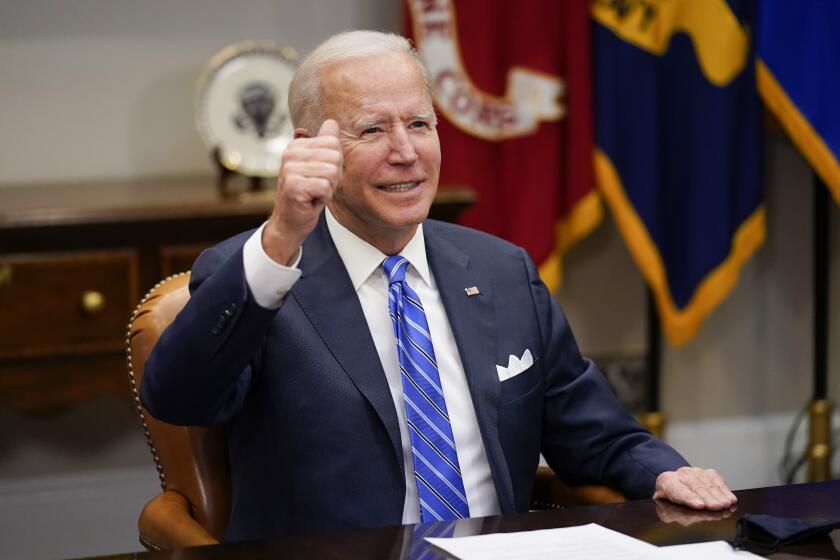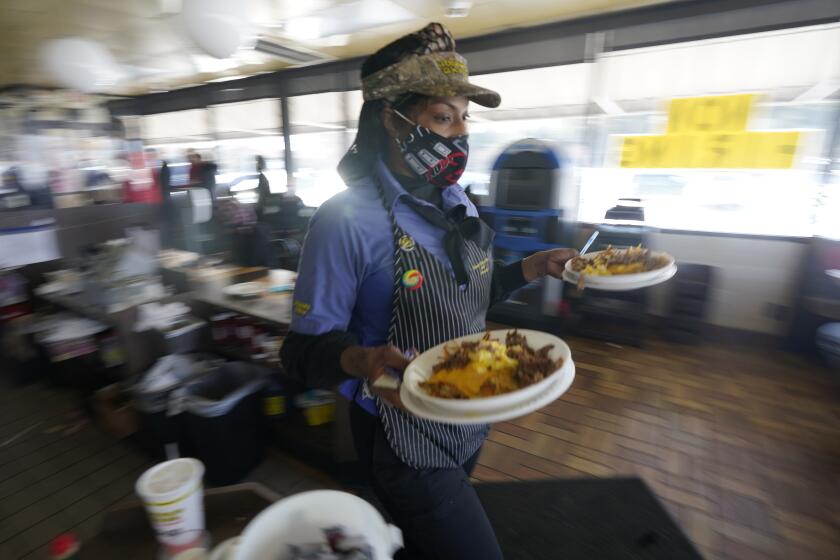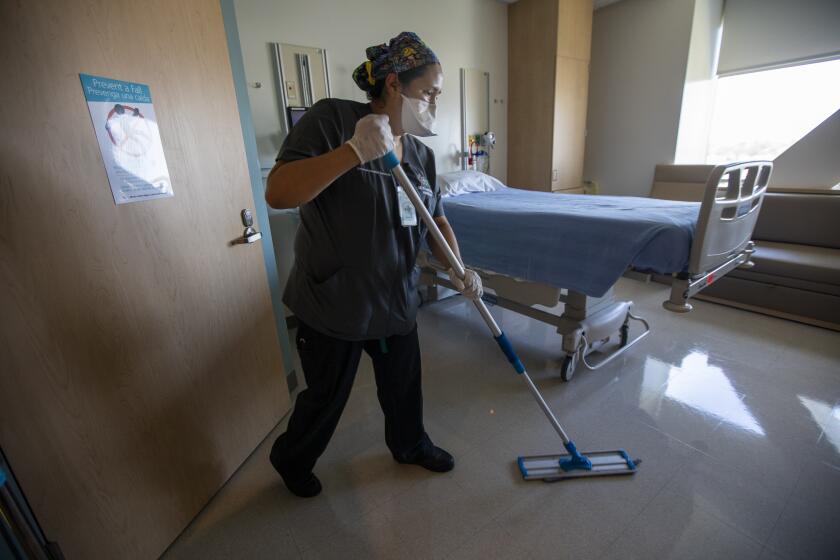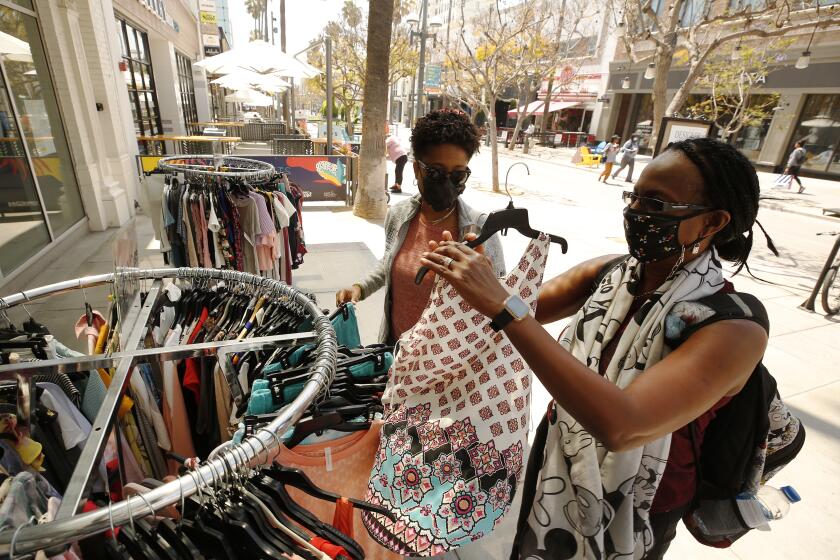Republicans voted against Biden’s COVID relief package. Now some are busy touting it
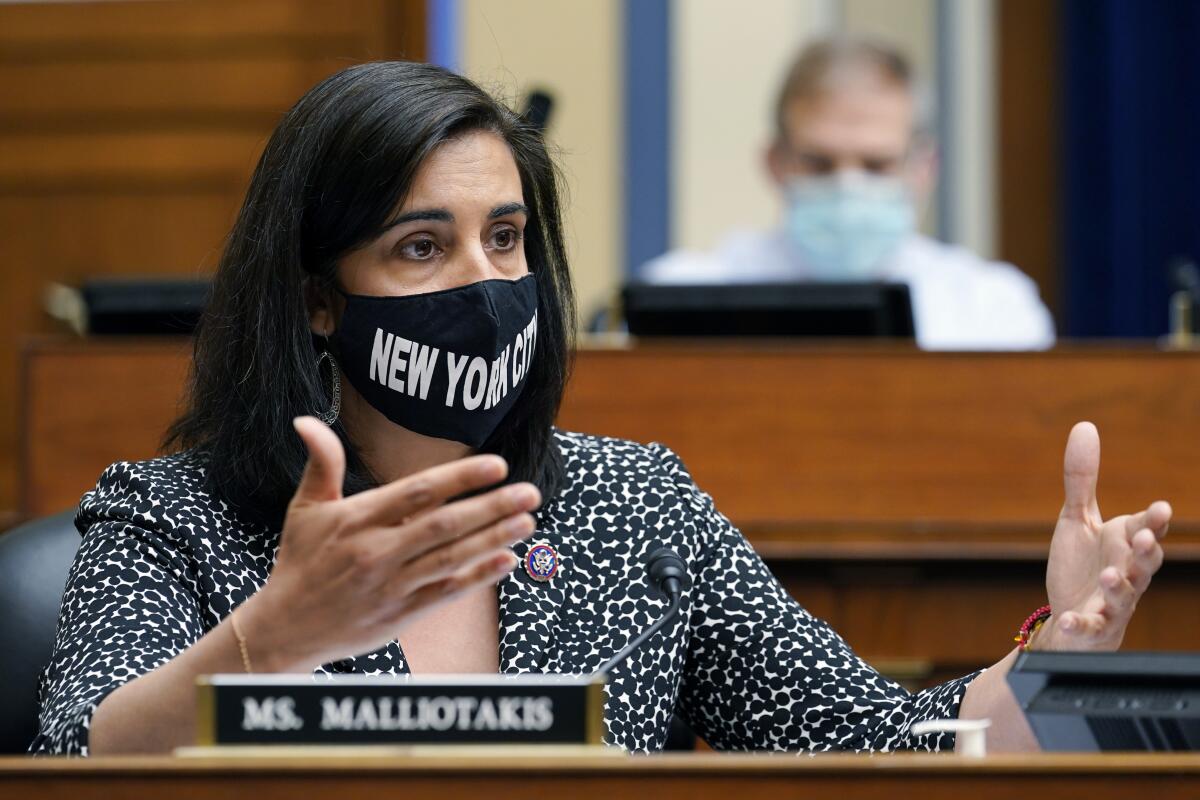
- Share via
NEW YORK — Republican Rep. Nicole Malliotakis said it pained her to vote against President Biden’s $1.9-trillion COVID-19 relief plan.
But in the weeks that followed, the first-term representative from New York issued a news release celebrating more than $3.7 million from the package that went to community health centers in her district as one of her “achievements.” She said she prided herself on “bringing federal funding to the district and back into the pockets of taxpayers.”
Malliotakis is far from alone.
Every GOP member of Congress voted against the sweeping pandemic relief bill that Biden signed into law two months ago. But since then, Republicans from New York to Washington state have promoted elements of the legislation they tried to defeat.
The Republicans’ favorite provisions represent a tiny sliver of the massive law, which sent $1,400 checks to millions of Americans, extended unemployment benefits until September, increased the child tax credit, offered housing assistance for millions of low-income Americans and expanded healthcare coverage. Republicans tried to negotiate a smaller package, arguing that Biden’s plan was too expensive and not focused enough on the nation’s health and economic crises.
Democrats are promising to make the pandemic relief vote — and the Republican resistance to it — a central element in their political strategy in the runup to next year’s midterm elections as they defend delicate House and Senate majorities. There are early signs that Republicans may struggle to defend their opposition to the popular legislative package, which was designed to protect the nation’s fragile economic recovery following the worst public health threat in a century.
Even sending $1400 checks to most Americans can’t guarantee smooth sailing ahead for Biden and the Democrats.
GOP lawmakers have been especially bullish about promoting the rescue plan’s Restaurant Revitalization Fund, which devoted $28.6 billion to the struggling industry. Applications for the program opened this week.
House Minority Leader Kevin McCarthy (R-Bakersfield) topped a group of at least eight Republicans who have encouraged constituents to apply in recent days. The others included Sen. Roger Wicker of Mississippi and Reps. Elise Stefanik of New York, Greg Pence of Indiana, Jaime Herrera Beutler of Washington, Beth Van Duyne of Texas, and Troy Balderson and Anthony Gonzalez of Ohio.
“The congresswoman is using her platform to inform her constituents of federal funds and resources available to them,” Stefanik spokesperson Karoline Leavitt said. “She did not claim to support the bill in the tweet, and her constituents deserve to know about federal programs they can apply for regardless of how she votes.”
Wicker’s office noted that he voted against the full package but led efforts to ensure that restaurant relief was included.
Counties that allowed restaurant dining saw increases in COVID-19 case and death rates, while those that implemented mask mandates saw declines in both.
“Sen. Wicker co-authored the amendment that successfully added the restaurant provision to the reconciliation bill. Why wouldn’t he want to encourage participation?” Wicker spokesman Phillip Waller said.
The Independent Restaurant Coalition acknowledged the Republican’s awkward position but offered its thanks anyway.
“Senator Wicker did not vote for the package (we wish all members did!), but his work on the RESTAURANTS Act from the beginning made the relief fund possible,” the industry group tweeted. “We are grateful for that work.”
White House spokesman Andrew Bates sarcastically expressed appreciation for the Republicans who have begun to tout elements of Biden’s stimulus.
Get our L.A. Times Politics newsletter
The latest news, analysis and insights from our politics team.
You may occasionally receive promotional content from the Los Angeles Times.
“The American people — majorities of Democrats, independents and Republicans — have long been firmly unified behind the American Rescue Plan,” Bates said. “So it’s heartening to see Republicans in Congress reaching across the aisle to endorse it — even retroactively.”
The politics of the Republican position are complicated.
The GOP ultimately benefited politically after uniting against the massive economic stimulus package signed into law by President Obama in 2009 during the global financial crisis. Republicans scored massive gains in the House and Senate the following year.
While the GOP is optimistic it will retake the House in 2022, it’s far from clear whether the stimulus vote will help it do so. Polling suggests that the Biden relief package is overwhelmingly popular. Two in 3 voters have consistently supported the $1.9-trillion plan in recent polling, while individual elements such as the $1,400 direct payments to individuals are even more popular.
The number of COVID-19 patients reported statewide Monday was 1,608 — the lowest since tracking began on March 30, 2020.
And just three months after the bill was signed into law, the Republican opposition has only begun to be tested.
The Democratic National Committee has already launched “digital takeovers” of local news websites in Arizona, Georgia, Wisconsin, Nevada, New Hampshire, Florida, North Carolina and Pennsylvania to thank Democrats and highlight the Republican obstruction. The White House’s political arm has also put up billboards in 20 states calling out Republicans.
“Between now and next year’s midterm elections, we’re going to make sure every voter remembers how Republicans tried to stand in the way of this economic boom and our return to normalcy,” said DNC spokesman Ammar Moussa. “And you can count on Democrats to call Republicans out for their hypocrisy when they try to tout the same programs they voted against.”
Beyond funding for restaurants, Republicans have also touted millions of dollars in healthcare grants allocated to their districts in the latest stimulus plan.
L.A. hoping to supercharge economy by summer. But will tourists and office workers really return?
Rep. Madison Cawthorn (R-N.C.) in late March pointed to millions of dollars in such grants on social media, saying he was “proud” to see the taxpayer dollars returning to his district. A spokesman did not respond to a request for comment.
Rep. Alex Mooney (R-W.Va.) issued a news release at roughly the same time to promote more than $41 million spread across 12 healthcare centers in his district.
“I am glad that this funding has been secured,” he said, neglecting to mention how it was secured.
The four-term Republican congressman defended his decision to highlight the grants this week in a statement.
A federal judge ruled the CDC has no authority to declare a nationwide eviction moratorium during the COVID-19 pandemic. What does this mean for renters?
“Despite what anyone claims, all money that is appropriated by Congress is derived from the taxpayer, not President Biden,” Mooney said. “Taxpayers deserve to know how their money is being spent, especially as it affects their towns and communities.”
Malliotakis of New York, who took office in January, promoted more than $3.7 million in healthcare grants from the Biden stimulus among her achievements in a self-issued “First 100 Days Report Card.”
“These grants were among the 9% of funds dedicated to COVID-19 relief that I was always in support of,” Malliotakis said in a statement. “Regardless of any particular vote, I’m going to help individuals, small businesses and nonprofit organizations get funding they are entitled to.”
More to Read
Sign up for Essential California
The most important California stories and recommendations in your inbox every morning.
You may occasionally receive promotional content from the Los Angeles Times.
